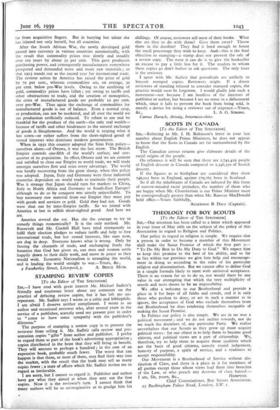STAMPING REVIEW COPIES
[To the Editor of THE SPECTATOR] SIR,—I have read with great interest Mr. Michael Sadleir's friendly and courteous letter about my comment on the practice of defacing review copies, but it has left me un- repentant. Mr. Sadleir says I wrote as a critic and bibliophile. I am afraid I deserve neither compliment. I wrote as an author and occasional reviewer who, after several years in the service of a publisher, scarcely need my present post in order to " come to have some sympathy with the publisher's dilemma."
The purpose of stamping a review copy is to prevent the reviewer from selling it. Mr. Sadleir calls review and pre- sentation copies " gifts" from author and publisher. I prefer to regard them as part of the book's advertising appropriation ; copies distributed in the hope that they will bring in benefit. They will amount to perhaps a hundred ; in the case of an expensive book, probably much fewer. The worst that can happen is that these, or most of them, may find their way into the market, with the result that the book may sell so many copies fewer ; a state of affairs which Mr. Sadleir invites me to regard as intolerable. I am sorry, but I cannot so regard it. Publisher and author have got what they aimed at when they sent out the free copies. Now it is the reviewer's turn. I cannot think that many authors will be so unimaginative as to grudge him his
shillings. Of course, reviewers sell most of their books. What else are they to do with them? Give them away? Throw them in the dustbin? They find it hard enough to house the small percentage they wish to keep. And—this is the final objection to stamping—a stamp does not prevent the sale of a review copy. The most it can do is to give the bookseller an excuse to pay a little less for it. The readers to whom these copies go don't bother to ask questions. The only loser is the reviewer.
I agree with Mr. Sadleir that periodicals are unlikely to boycott stamped copies. Reviewers might. If a dozen reviewers of standing refused to consider stamped copies, the practice would soon be forgotten. I would gladly join such a movement—not because I am heedless of the interests of publisher or author, but because I see no sense in a defacement which, since it fails to prevent the book from being sold, is merely a device for doing a reviewer out of sixpence.—Yours,
&c., L. A. G. STRONG. Cam us Darach, Arisaig, Inverness-shire.






















































 Previous page
Previous page